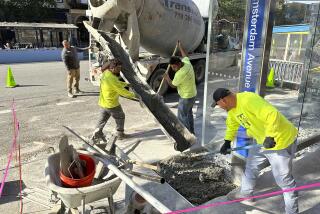Re-energize your job search
While the economy may be slowly recovering, it’s still tough to find a job, and millions of workers have been unemployed for far longer than they’d like.
As of March, more than 6.5 million were unemployed for 27 weeks or longer. Not only can unemployment drain resources, it can take a toll on the psyche of the unsuccessful job seeker.
One such would-be employee, Julie in Medfield, Mass. (who asked that her last name not be used), has been looking for full-time work for the two years since she was laid off from a struggling software firm.
“It’s very, very hard to keep motivated because two years is such a long time. I have gone on a good number of interviews, and I haven’t succeeded, so it’s very demoralizing,” she said.
She has more than 12 years of experience as a high-tech controller, but can’t find a good long-term job match. Although she said “fear is a great motivator” to keep up the job search, she has also been encouraged by a recruiter she began working with about six months ago.
“He’s working really hard for me, so that has been good for my morale,” Julie said. “He has really gotten to know me. He consistently calls me about various possibilities. He’s working for me to the extent that he can, and he is very encouraging.”
Recruiters are just one way that the long-term unemployed can re-energize their search, experts said.
Job seekers should never lose sight of the importance of networking, experts said.
Getting “lost in the Internet” is disheartening, and actual face time is critical, said Allison O’Kelly, chief executive of Mom Corps, a staffing firm based in Atlanta that specializes in flexible employment.
“A lot of people see potential jobs (on the Internet), and they apply, and they are not getting called, and they decide there is nothing out there,” O’Kelly said. “The way people are really getting jobs is by meeting people. The face-to-face interaction makes such a huge difference.”
Unfortunately, long-term unemployment can discourage job seekers, and they lose the desire to network, she said.
“But that’s exactly what you need to do in order to access some of these jobs,” O’Kelly said. “It’s about developing a relationship. To really know what’s available you really need to get out there and meet people and talk to them about your skills.”
Unemployed workers should go to industry events, said Nancy Mellard, national leader of CBIZ Women’s Advantage, a mentoring and networking program for woman workers.
“You are staying fresh and alive by being around people who are working,” Mellard said. “It’s not just trading business cards. It’s more about how many of these people connect with the story you tell about yourself.”
Volunteering can also help long-term unemployed workers network, said John McKee, founder and chief executive of BusinessSuccessCoach.net.
“It has the side benefit of creating new relationships and getting in touch with people you might otherwise not be in touch with,” McKee said.
Due to budget cuts, there is much need for volunteers now, O’Kelly said.
“You can make great contacts and this is something you can put on your resume and show that you have been doing things even though you have been out,” O’Kelly said.
The labor market is tight _ there are more than five potential applicants for each job opening _ and workers need to repackage themselves, and be willing to work in a new industry or function, experts said.
“Keep an open mind, especially if you are in an industry with lots of job losses,” said Jennifer Grasz, a spokeswoman for career site CareerBuilder.com.
Almost half of workers, 47 percent, who were laid off in the past 12 months and found new jobs work in a different field than they previously worked in, according to a recent survey from CareerBuilder.com.
Companies are starting to change focus from cost containment to growth, first bringing back areas that are most closely tied to revenue such as sales, marketing, customer services and information technology.
“Look at how you can make your experience relevant to those functions,” Grasz said.
A lack of openings in a worker’s chosen profession can be depressing, Mellard said, and suggested that job seekers “think outside of the box.”
“Go to networking events not in your field,” Mellard said. “This would also be advice I would give to someone out of the labor market for some period of time.”
Revamping your resume can also re-energize a job hunt, experts said.
Job seekers should make sure their resumes are optimally constructed for the Internet and databases. Resumes should contain key words that gain attention, said Eric Winegardner, vice president, client adoption with career site Monster.com.
“You have to look at your resume through a technology eye,” Winegardner said.
He recommended that workers find key words in interesting job postings, and make sure the words are in their resume.
“What are the different words to describe the job you want?” Winegardner said. “The burden right now is on the person to describe themselves.”
He added that job seekers need to make sure their resumes are in the right databases.
“Because there are so many people out of work right now, a lot of employers or recruiters are not putting out the message that they are hiring because they will get hundreds and hundreds of people who want that role,” Winegardner said. “They are turning to databases. If you are not in those databases to be found, that’s a problem.”
While chronological resumes are popular, workers should also create a functional resume, which emphasizes skills and won’t highlight long-term unemployment.
Carolyn McCarthy, a Duxbury, Mass., job seeker who has been in the market for two years, has removed dates from her resume so that recruiters don’t dismiss her out of hand.
“I have gotten more phone calls,” McCarthy said.
Long-term job seekers should set daily goals, such as crafting a new resume, adding information to a social-media profile or taking someone to lunch who can offer advice or make introductions, experts said.
“It can be tough day after day if you are not finding a job in a timeframe that you’d like,” Grasz said. “You want to make sure you are setting goals for each day that are realistic.”
She also recommended that job seekers can go to school to make themselves more marketable.
“This could be a formal degree, or a seminar. Actively pursuing knowledge shows employers that you are staying active,” Grasz said.
McKee recommended that long-term job seekers evaluate themselves by considering their strengths, weaknesses, opportunities and threats.
“This engages you so you are not sitting there wondering about why the phone is not ringing,” McKee said. “This is a good objective way to do an appraisal and give yourself direction about what you might want to build on or avoid.”
He also recommended that job seekers offer their services as an entrepreneur.
“Most of my clients are surprised by how much money they keep in their pockets as an entrepreneur, compared with their take home as employees,” McKee said.
O’Kelly recommended that job seekers consider temporary work.
“The temp labor market is really picking up. People should look at these opportunities seriously because they could turn into permanent positions,” O’Kelly said.
--------------------------------------------------------------------------
c) 2010, MarketWatch.com Inc.
Visit MarketWatch on at https://www.marketwatch.com
Distributed by McClatchy-Tribune Information Services






